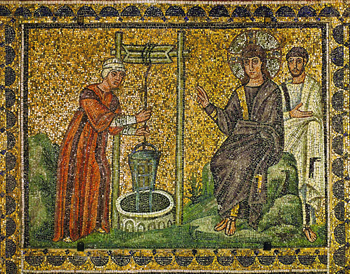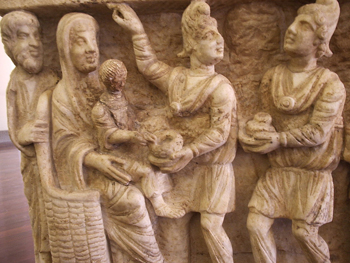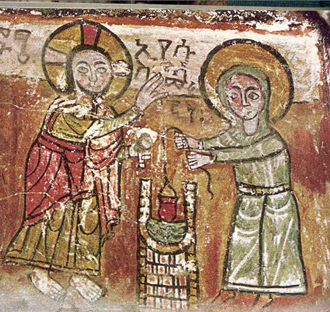For Sunday January 24, 2016
Lectionary Readings (Revised Common Lectionary, Year C)
Nehemiah 8:1–3, 5–6, 8–10
Psalm 19
1 Corinthians 12:12–31a
Luke 4:14–21
I wasn't going to write about the controversy at Wheaton College in Illinois, but then major media like CNN, Time, NPR, and The Atlantic started giving it major coverage. I also saw how Luke's gospel for this week speaks directly to the matter.
On January 4, Wheaton notified Larycia Hawkins that it had initiated formal proceedings to terminate her employment. A tenured political science professor, and Wheaton's first female black tenured professor, in December Hawkins posted a picture of herself on Facebook wearing the hijab, and stated her support for Muslims after the terrorist attacks in Paris and San Bernadino.
"I stand in religious solidarity with Muslims because they, like me, a Christian, are people of the book, and as Pope Francis stated…we worship the same God."
In Wheaton's conservative evangelical view, Hawkins's statement compromises trinitarian orthodoxy: "Her recently expressed views, including that Muslims and Christians worship the same God, appear to be in conflict with the College's Statement of Faith." Wheaton also says that Hawkins "declined to participate in further dialogue about the theological implications of her public statements and her December 17 response."
Hawkins, who has taught at Wheaton for nine years, disputes both
 |
|
Samaritan woman at the well, 6th century mosaic, Ravenna, Italy.
|
of these points. Last Monday (January 11), on the first day of the new semester, Wheaton faculty and students publicly demonstrated on her behalf. Important questions have also been raised about whether Wheaton has circumvented its own policies of due process.
I'm not surprised at what's happening at Wheaton, just sad that it's so predictable. And so common. There's nothing unusual about an institution protecting its orthodox boundaries.
Orthodoxies, or right belief and worship, have their place, especially when the alternative is believing something that's false or idolatrous. And orthodoxies aren't limited to conservative evangelicals, to Christianity, or even to religion.
There are all sorts of orthodoxies, whether secular or religious, left, right or center, whether in politics, economics, history, or science, and whether in private or public institutions. To give just one example from my own back yard — at the famously liberal UC Berkeley, some of my Jewish friends feel silenced by the pro-Palestinian orthodoxy.
Woe to the person who questions institutional orthodoxy — like Jesus did in Luke 4. It's fascinating how Luke's story pivots so sharply and so bitterly.
When Jesus taught in local synagogues, says Luke, "everyone praised him." When he commended compassion for the poor, the prisoners, the blind, and the oppressed, "all spoke well of him and were amazed at the gracious words that came from his lips."
But when the Jewish home towners asked for their own miracle, Jesus told two stories about how God blessed two unorthodox Gentiles—a widow in Zarephath in the region of Sidon, and Naaman the military commander of enemy Syria.
Their response? "All the people in the synagogue were furious when they heard this. They got up, drove Jesus out of the town, and took him to the brow of the hill on which the town was built, in order to throw him down the cliff."
Luke is the only Gentile author in the Bible, so he had some skin in this game. Whereas the very first sentence of Matthew calls Jesus "the son of David, son of Abraham," Luke's genealogy describes him as "the son of Adam" — that is, Jesus is not just the king of the Jews, he's the son of all humanity.
For Jesus, the election of the Jews does not mean the exclusion of the Gentiles. Throughout the gospels, the Jewish Jesus embraced the unclean Gentiles — the Roman centurion, the Canaanite woman and her demon-possessed daughter, and Samaritans like the leper in Luke 17, the woman at the well in John 4, and the good Samaritan of Luke 10.
 |
|
The Gentile magi with Jesus, 3rd-century sarcophagus, Rome.
|
What about other orthodoxies, like ritual purity? Jesus "declared all foods clean." Keeping the sabbath? "The sabbath was made for man, not man for the sabbath." And the temple? Jesus called it a "house of prayer for all nations."
Orthodoxies can lead to a sense of entitlement, privilege, and superiority, not to mention power over another person. They can foster communities that are insular, isolated, and exclusive.
In 2012 when my wife and I walked the 500-mile "Way of St. James" in Spain, it became clear as we traded notes with other pilgrims that one of the most invigorating aspects of the walk was encountering so many different people with so many different stories. One of our closest friends, Marie Therese from Paris, even lamented with a bit of laughter, "we French are so fermé!"—that is, "closed" to others.
Yehuda Amichai (1924–2000), Israel's most celebrated poet, whose works have been translated into forty languages, speaks to this aspect of orthodoxies.
From the place where we are right
Flowers will never grow
In the spring.The place where we are right
Is hard and trampled
Like a yard.But doubts and loves
Dig up the world
Like a mole, a plow.
And a whisper will be heard in the place
Where the ruined
House once stood.
Last week I read a book by Carla Power called If the Oceans Were Ink; An Unlikely Friendship and a Journey to the Heart of the Quran. It's a memoir about her year studying the Quran with her friend Sheikh Mohammad Akram Nadwi of Oxford. The book was a finalist for the 2015 National Book Award in non-fiction. Power moves us beyond crude stereotypes and convenient generalizations.
Power calls herself a "skeptical" feminist and "dutiful little secularist." Her Jewish father and Quaker mother were both non-practicing. She grew up in Tehran, Kabul, Delhi, and Cairo, but admits that her knowledge of Islam was always secondhand. That is, until she studied with Nadwi, a friend of twenty years.
The Sunni Nadwi defies labels. He was born in India and made his way to Oxford. Fluent in several languages, he's published twenty-five books. He's also completed a biographical dictionary in 53 volumes that identifies over 8,000 women scholars of hadith (a collection of traditions about the words and deeds of the Prophet Mohammad). He's complicated enough to disappoint both progressives and traditionalists.
When "properly read," Nadwi insists, the Quran "reveals a just and humane faith." And so a major theme of his work has been a close reading of the original sources to excavate the spiritual essence of the faith.
He laments the cultural accretions that have ossified true faith, politics that supplant genuine piety, and ancient customs that have no support in the Quran. For him, islam (small i), meaning submission or surrender, is more of a verb than a noun that describes institutionalized religion. What matters most is taqwa or God-consciousness. We must always respect human conscience, says Nadwi, for there can never be compulsion in true religion.
But Nadwi is hardly a liberal. He accepts polygamy and traditional domestic roles for women (he has six daughters). He believes in a literal paradise for believers and hell for unbelievers like Power. He's opposed to homosexuality. Veiling is fine, despite all sorts of cultural complexities and nuances.
 |
|
Samaritan woman at the well, wall painting, Church of St. Mary, 13th century, Ethiopia.
|
At times, Power's narrative borders on hagiography. She's captivated by Nadwi's combination of erudition, piety, and kindness. But in the end, she admits that theirs was a one-way conversation rather than a dialogue: "I wanted him to take a step toward my worldview, as I'd done toward his." That was never going to happen.
I was challenged by Power's intentional openness to a genuine Other. It's a spirituality that we can all practice, each in our own way and in our own little world.
On the last page of her book, she writes, "if understanding difference is among my own key values, it is also a Quranic one. Only through diversity, says the Quran, can you truly learn the shape and heft of your own humanity: "O humankind, We created you from a male and female, / and We made you races and tribes / for you to get to know each other. (49.13)."
So, what about orthodoxy? And who is my own Other?
I've always liked how the Yale theologian Hans Frei put it: "Generosity without orthodoxy is nothing. But orthodoxy without generosity is worse than nothing." Which is to say, orthopraxis, or right living, is just as important as orthodoxy, right believing.
For further reflection
Amartya Sen, Identity and Violence; The Illusion of Destiny (2006)
Tzvetan Todorov, The Conquest of America: The Meaning of the Other (1984)
Miroslav Volf, Exclusion and Embrace (1996)
Image credits: (1) WilliamBryantLogan.com; (2) Wikipedia.org; and (3) Wordpress.com.





